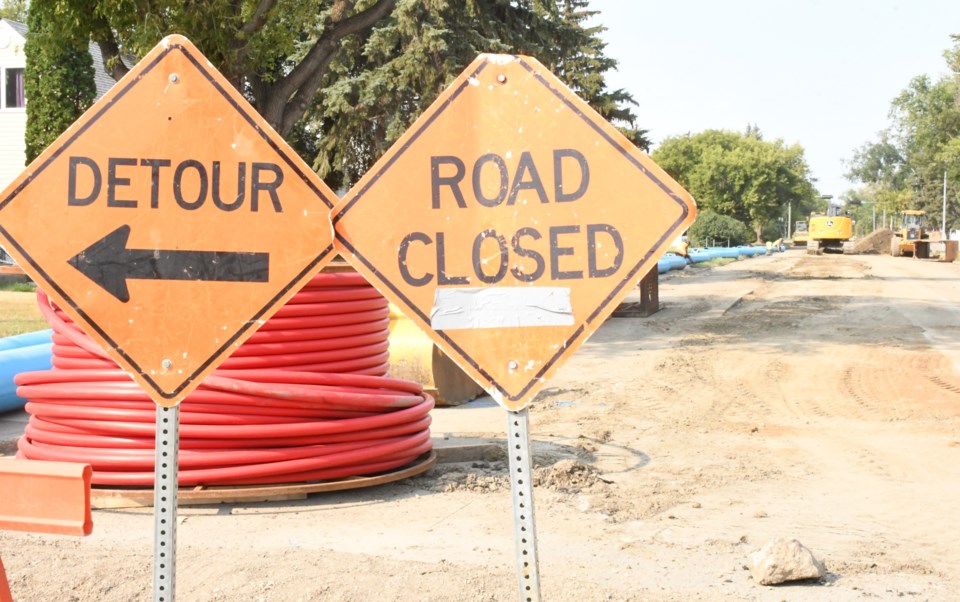MOOSE JAW — The public works and utilities division wants money to create a road closure business unit to support traffic safety initiatives, whether it’s closing streets for Sidewalk Days or purchasing supplies for construction zones.
During its Jan. 20 budget meeting, city council voted 6-1 to use $80,273 from the traffic safety reserve for road closure projects in the public works and utilities (PWU) division’s operating budget. Moreover, the reserve — and not the operating budget, as originally suggested — will fund this program in the future.
Coun. Heather Eby opposed the motion because she didn’t agree with how the initiative would be funded.
- Broken down by category, the funding will support:
- Computer software purchase: $1,557
- Education and meetings: $15,936
- Equipment rental charges: $10,000
- Maintenance supplies: $42,000
- Advertising and promotions: $2,600
- Labour wages: $6,725
- Employee benefits: $1,455
City hall started “significant efforts” last year to improve road safety around job sites through activities such as traffic bylaw revisions, training a supervisor, procuring traffic control software and working with the Moose Jaw Police Service on a communications campaign, the report said.
Some work that PWU pursued last year included:
- Minor repairs and maintenance to bridges and protective railings
- Grading and maintaining gravel roads
- Assisting with Christmas lights, downtown lights and emergency response scenes
- Road and sidewalk repairs and maintenance
- Snow plowing and hauling
The division continues to review, discuss and adjust the scope of work, methods, resources and gaps in its services, while two factors spurred the need for roadway closures using reserve funding, the report continued.
One factor is the need to increase support for road safety, including using a third-party contractor to oversee, inspect and support projects, work-zone training for staff, software training and support for traffic plans and implementation, ongoing renewal of barricades and no-entry signs, traffic and information signs, and developing a traffic control manual.
The second factor is the offering of in-kind services, where PWU provides staff, resources, supplies and services for events such as Sidewalk Days, the Hometown Parade and the Santa Claus Parade.
“The city offers these services at no charge, with an estimated value of $20,000,” the report said. “Additionally, supplies and service are provided for numerous smaller events throughout the city.”
Administration told council that the automated speed enforcement cameras generate $800,000 to $900,000 annually in revenue, some of which goes to Moose Jaw’s traffic safety reserve fund; that account contains over $1.9 million. Besides supporting budget-focused capital initiatives, that fund also addresses the MJPS’s traffic safety initiatives; the agency wants $330,000 this year.
Council discussion
Coun. Chris Warren thought the road closure initiative was valuable, especially since council wanted to keep safe all city crews and the public around construction zones.
However, Warren asked administration whether it required this funding annually to support the business unit and if the reserve account would supply the money. Moreover, since $80,000 represented 0.2 per cent of a mill rate increase, he wondered whether council would have to cover that in 2026.
Finance director Brian Acker replied that the reserve account would fund the business unit this year, while in 2026 and beyond, administration may fund that unit through the operating budget. Furthermore, if the business unit required $80,000 next year, unless council found another funding source for it beyond operating, that would add 0.2 per cent to the mill rate.
“It would be a very minor amount,” he added. “Certainly, there are changes that occur in the budget every year … (because) things cost more to deliver.”
Warren later said that the traffic safety reserve should fund this initiative always, considering administration usually asks for more staff positions and increased resources for projects, all of which increase taxes and affect residents. He also understood that while using reserve money may mean less funding for capital projects, he wanted council to keep its spending in check.
Administration told council that it is shifting $1.4 million from that reserve to the general capital reserve for projects such as traffic controls and structure upgrades.
Coun. Dawn Luhning wanted the traffic safety reserve to fund the business unit annually because she didn’t want to add 0.2 per cent to next year’s tax increase. As an elected official, she wanted to ensure residents received value for the tax increases they faced.
Coun. Jamey Logan agreed, while he was particularly excited about the creation of a traffic control manual, which was “imperative” to protect the safety of city crews and contractors from inattentive motorists who drive through closed work zones.
Coun. Patrick Boyle also supported using reserve funding, saying he was “a little leery” about council potentially adding to next year’s mill rate increase during current discussions. He thought that was “a little bit of a risky practice” because the 2026 budget could start with a large tax increase.




